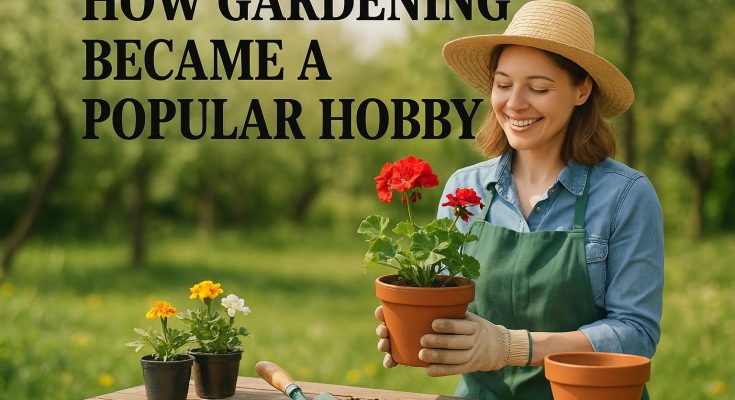The Rise in Popularity of Gardening
Over recent years, gardening has emerged as a popular hobby among individuals of various age groups and backgrounds. This trend can be attributed to several interconnected factors that have reshaped societal interests and lifestyle choices. Let us explore these factors more thoroughly, examining how they have contributed to the increasing allure of gardening across diverse sectors of society.
Urbanization and the Need for Green Spaces
As urbanization continues to dominate landscape changes globally, the demand for green spaces has seen a significant rise. Urban areas often lack adequate natural spaces, leading many city dwellers to seek out opportunities to bring greenery into their lives. Gardening has become an accessible solution to this urban challenge, allowing individuals to nurture greenery within the confines of limited city spaces.
Urban gardening initiatives have gained momentum, with many people cultivating small potted plants on balconies or nurturing plants in communal gardens. In densely populated areas where public parks are limited, community gardens provide vital green oases. These spaces foster a sense of community and provide urban residents a slice of nature amidst the urban sprawl. Gardening in these urban environments not only meets an aesthetic need but also satisfies a fundamental human desire to connect with nature.
Impact of the COVID-19 Pandemic
The COVID-19 pandemic dramatically altered the way we live, forcing many into prolonged stays at home due to lockdowns and movement restrictions. During this period, numerous individuals turned to indoor leisure activities, reigniting interests that could be pursued within their immediate environments. Gardening emerged as one such viable hobby, offering a blend of productivity and tranquility.
The surge in gardening during the pandemic can be attributed to its therapeutic benefits. Tending to a garden involves physical activity, which promotes better health—even with minimal space. The process of caring for plants offers a sense of accomplishment and serenity amidst the uncertainties of the pandemic. As individuals discovered the calming effects of gardening during these times, many decided to continue their green endeavors as a long-term hobby, expanding from nurturing potted plants to experimenting with small-scale vegetable gardening.
Health and Wellness Benefits
Beyond the immediate relaxation gardening offers, there are broader health benefits linked with this activity. Physical exertion involved in gardening serves as a practical way of encouraging regular exercise. Activities such as digging, planting, and weeding can improve physical strength and flexibility. In this way, gardening becomes an admirable exercise alternative for those seeking moderate physical activity.
Furthermore, interacting with nature has been scientifically shown to enhance mental well-being. Spending time amid plants reduces stress levels and fosters a state of mindfulness, aiding in lowering anxiety and depression symptoms. Various academic studies support the notion that these mental health benefits are a fundamental draw for individuals adopting gardening as a pastime. Gardening nurtures not only plants but also fosters emotional and mental health, proving to be a holistic activity benefiting both mind and body.
Environmental Concerns and Sustainability
In recent times, growing environmental awareness has prompted individuals to incorporate sustainable practices into their everyday lives. Amidst this ecological awakening, gardening offers an opportunity to effect direct positive change. By cultivating plants, gardeners actively contribute to improving air quality and supporting global biodiversity within their surroundings.
Home gardening also plays a key role in reducing dependency on external food supply chains. By growing their fruits and vegetables, individuals can decrease their carbon footprint associated with transporting produce. Consuming home-grown crops, free from commercial agricultural processes, supports a self-sustainable lifestyle that many find environmentally rewarding. Additionally, adopting sustainable gardening practices such as composting and rainwater harvesting enhances these efforts, fostering an eco-friendly ethos among gardening enthusiasts.
Technological Advancements and Resources
The digital age has revolutionized many aspects of daily life, and gardening has not been left behind. An array of resources and technological advancements now make gardening more accessible than ever before. The online realm is filled with abundant materials: tutorials, forums, blogs, and gardens-specific apps—all designed to guide aspiring gardeners on their growing journeys.
Digital platforms have eliminated much of the guesswork associated with gardening. Novices can find detailed instructions and troubleshoot techniques to ease their gardening processes. Technology has not only equipped beginners with stone-grounded knowledge but has also broken down traditional barriers to entry into variegated fields of gardening. From hydroponics to vertical gardens, technology has opened new channels in which beginners and seasoned gardeners can thrive.
Community and Social Interaction
Gardening, previously seen as a solitary activity, has evolved into a vibrant, social experience. People with a shared interest in gardening are increasingly forming community bonds, sharing experiences, triumphs, and tribulations as they nurture their plants. Online gardening communities, forums, and social media platforms now serve as invaluable spaces for interaction and mutual support.
These virtual communities allow for idea exchanges that build collective knowledge and elevate personal gardening experiences. Members share tips, troubleshoot challenges, and celebrate each other’s successes, creating a driven and dynamic network of gardening enthusiasts. This network fosters togetherness and inspires individuals to remain committed to gardening, even those who may rarely garden with others physically.
In summary, the rise of gardening as a popular hobby is a multifaceted phenomenon influenced by urbanization, public health awareness, heightened environmental consciousness, the incorporation of digital technology, and the cultivation of community through gardening. Gardening’s appeal lies in its simplicity and accessibility, offering plentiful rewards to those who participate. As gardening continues to evolve, it will likely remain an integral part of the lifestyles of those who have embraced its many benefits, continuing to enrich their living spaces and promote well-being for years, if not generations, to come.





